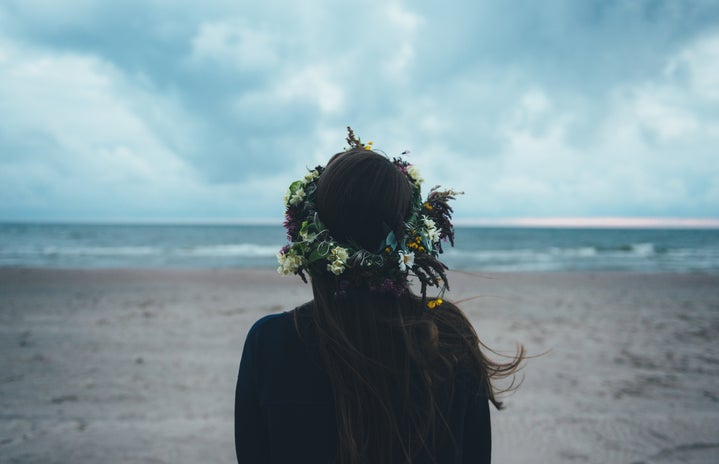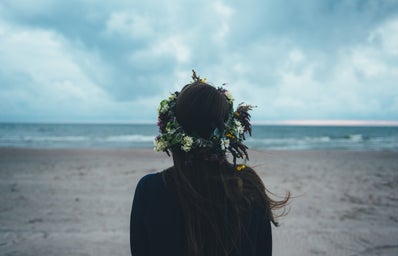Often times, people ask themselves “who am I? Who do I want to be in five years? Who do I think I should be right now?” Surprisingly, most of these soul-searching questions come hand-in-hand in the moments that women of color change their hair. I sat down with Majesti Grubb, a Jamaican-American and third-year Wells College student from New York City, and I soon realized we had more in common than we could have thought.
“Growing up, I had really, really thick hair and that was the issue when my mom would want to do my hair. It was an issue because combing through it would hurt me, and she would kind of just do styles that would tame my hair. My mother was trying, not doing it to look nice, but to get it under control. I have really tight coils, an afro basically. I didn’t experience being young with my natural hair very long, because you always want to do what your big sister does. At the age of 8 I got a perm, because my sister got a perm and I just wanted to be like my sister.”
Grubb recalled instances in which people negatively responded to her personal choices in embracing her natural hair. “When I was younger in high school and I started the whole ‘natural thing’, I got a lot of negative backlash for it. Like, ‘why’d you do your hair like that,’ or ‘you should put a weave in.’ Basically, I should do this and that because of what the social norm is, and what they deemed pretty wasn’t that puff, that coily, nappy hair so to speak. I let people’s opinions get in the way of how I appreciate my hair.”
“It wasn’t until I came to college, where people are more open and accepting of things. Now, I appreciate my hair way more. I had a person ask me ‘how come your curls don’t look like hers?’ A common misconception is because we’re black, we’re supposed to have the same type of hair, not knowing that we are two different forms of black. People just assume that we’re all going to have the same type of hair, and that’s not how it works. I perceived the person saying that to me as an ‘her hair is better than yours, so why can’t you get your hair to look like hers so that I’m not uncomfortable.’ But, it really isn’t about you. You don’t have to stay up all night and twist my hair, or undergo the process that I have to just for my hair to be tamed. It does affect me though, because then I’m like well maybe my hair’s not nice.”
Black women in America are often shamed for many things, but hair is constant. Black women are told their hair shouldn’t be too big because then they would be taking up too much space. They would be too loud and bold, and they shouldn’t draw attention to themselves. Black women are told their hair shouldn’t be too kinky, because it’s ugly and “does that type of hair even grow?” Black women are told having their hair wrapped in silk, colorful scarves are unprofessional. Black women are told to get their hair pressed and that their edges need to be laid. How are black women supposed to have confidence and appreciation for themselves if we won’t give them that chance? The journey to completely love themselves is interrupted because they are told at young ages that what and who they are is not good enough. I asked Majesti what her relationship with her curls was like today, and how she felt they fit into her identity.
“Do I appreciate my hair more? Yes, I do. Often, you’ll hear people say ‘that hairstyle suits you.’ Hair adds a spunk and adds to your personality. It’s a part of you, it’s not just something that’s on top of your head. It literally defines who you are as a person. Some people do their hair based on how they’re feeling, you can tell by how I wear my hair that maybe I’m having a bad day, or maybe I’m feeling myself. I feel like hair is more than just hair, it’s my identity. It’s part of who I am. I want to be natural, I want to stand out and I want to be more authentic, rather than just trying to chase the European idea of beauty. Beauty is within and that’s what people fail to realize. We should be searching within to find our beauty, and letting it reflect outward in the way we carry ourselves. When you have people around you that are part of the movement, it makes it easier to also be a part of it, so I’m not alone. I really do appreciate and value other women of color that are rocking their natural hair.”
Majesti’s hair is a part of her ethnicity, race, and culture. Therefore, her hair is a part of who she is. Enduring criticism that came from too many directions altered her view of herself, but her hair is a reminder that only she can say who she is. College is the place where young adults can go to begin their journey into discovering who they are. It seems as if Majesti’s is just beginning, but she is surrounded by support and affection from her fellow black and brown women. Like Majesti said, she is not alone.
Kat Puello Photography.


